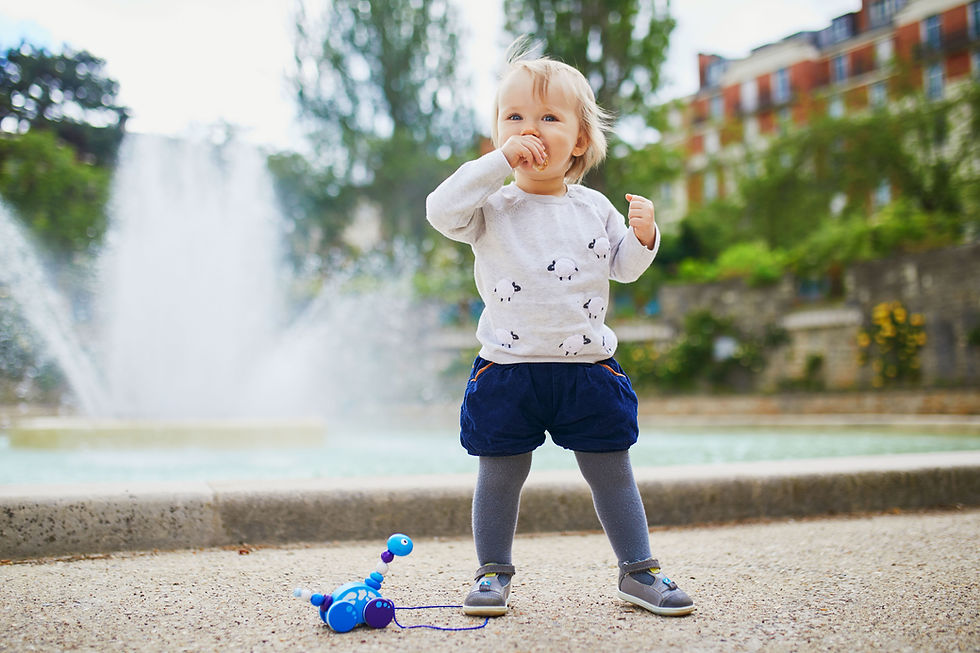12 Month/1 Year Milestones Checklist
- Dr. Hughes, The Pediatric Mama

- May 17, 2021
- 3 min read
My Baby is 12 Months (1 Year) Old: What should he/she be able to do?

It's been a full year with your bundle of joy and he/she is growing up before your eyes! Here are the things you should expect your child to do by 12 months of age.
By 12 months of age, your child should be able to:
Gross Motor/Physical Movement
May take his/her first steps (but really has up until 18 months to walk)
If not walking just yet, should be able to stand alone
Get to a sitting position without help
Fine Motor/Hand-Eye Coordination
Point to things with his/her index (pointer) finger
Feed him/herself finger foods
Social/Emotional
Show stranger and separation anxiety
Has preferred toys
Language/Communication
Use simple gestures, like shaking head “no” or waving “bye-bye”
Make sounds with changes in tone (sounds more like real speech)
Says at least 3 words you can understand, often “mama” and “dada” and one other
Use “mama” and “dada appropriately
Try to repeat words/sounds he/she hears (similar sound even if you still can't really understand the word)
Cognitive/ Learning & Problem-solving)
Explore things by shaking, banging, throwing, etc
Find hidden things easily
Copy gestures he/she sees (clapping, pat-a-cake, etc)
Play peek-a-boo and pat-a-cake
Hand you a book or toy when wants to hear a story or wants to play
Follow one-step commands with gestures, like pointing and saying “pick up the toy”
If your child is 12 months old and is doing all of these things, great!!

Tips to Help Your Child Reach Their 12 Month Milestones
Play time: Create time each day for your child to play with toys and let them explore indoors and outdoors. Engage with your child by explaining things in simple terms and showing them how things work. Encourage them to try things on their own and let them explore a little on their own (while keeping a close eye on them).
Walking practice: Encourage and help your child to practice walking by:
holding their hands and letting them walk
letting them use a baby walker (always supervised and away from any stairs or ledges)
placing them a few steps away from you or a favorite toy and encouraging them to take steps toward you or the toy
Talk and respond: Talk to your baby as much as possible in plain language (no more "baby" talk) and encourage others not to use "baby" talk either. The more language your child hears, the more he/she will pick up as they begin to learn to talk. Respond when your child talks to continue to encourage social and conversational skills.
Read: Continue to read simple books to your child. Your child may now be more engaged in the story, especially if there are bright colors and lots of pictures (and funny voices can help too to make the story fun).

When to Be Worried
If your child is already 12 months of age and is not meeting these milestones, talk to your child’s pediatrician. You know your child better than anyone else. If you are concerned your child may have a delay in his/her development, it is better to intervene sooner rather than later. This gives your child the best chance of catching up to his/her peers by the time he or she reaches school age.
Subscribe to be notified of more posts like this!
All content on this website, including medical opinion and any other health-related information is for informational purposes only and should not be considered a specific diagnosis or treatment plan for any individual situation. Use of this website and the information contained does not create a doctor-patient relationship. Always seek the direct advice of your own doctor before starting any specific treatment plan.




Comments